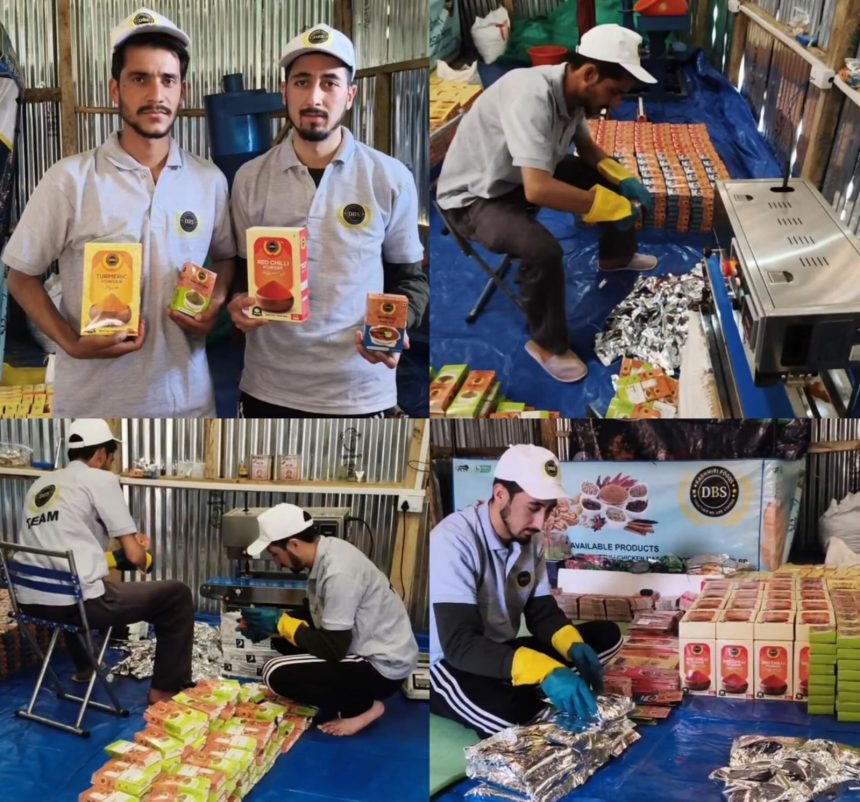Ramban, April 19: In a heartening tale of determination, innovation and self-reliance, Zubair Ahmed Drabu from Banihal has emerged as a symbol of youthful entrepreneurship by establishing Drabu Spices Banihal (DSB)—a micro-enterprise focused on the grinding, packaging, and marketing of high-quality spices. Located in Dooliga, Banihal, the unit was formalised under the Pradhan Mantri Formalisation of Micro Food Processing Enterprises (PMFME) scheme, which is being effectively implemented by the Department of Horticulture Planning and Marketing.
Zubair’s journey began in the shadow of personal tragedy. Following the loss of his father in 2006 and his mother in 2017, Zubair found himself solely responsible for the upbringing of his two younger sisters. Amid these hardships, he remained undeterred, balancing familial duties with an emerging ambition to establish a sustainable business. In 2019, he took his first entrepreneurial steps, engaging in the marketing of dry fruits and locally sourced agro-products—a move that would sow the seeds for what would later become DSB.
Through unwavering focus and support from the district administration and relevant departments, Zubair gradually transformed his informal setup into a formal, profit-making enterprise. With structured training, financial backing, technical guidance, and regular handholding, the once home-based operation has evolved into a professionally managed spice production unit. He credited much of his success to the proactive support of the district Administration Ramban, led by Deputy Commissioner Baseer-Ul-Haq Chaudhary, and the Department of Horticulture (Planning and Marketing), which ensured the effective rollout of employment-generating schemes like PMFME. These institutions not only recognised his potential but also helped him navigate key growth hurdles.
Among the critical interventions were specialised training at SKUAST-Jammu, participation in a high-profile international exhibition at Pragati Maidan in Delhi, and exposure to broader markets through a buyer-seller meet in Hyderabad. Zubair described these opportunities as transformative, stating that they opened new doors for market linkages and product positioning.
With facilitation from the PMFME scheme, Zubair secured a loan of Rs 8.70 lakh from J&K Bank, bolstered by a 35 percent back-ended subsidy. This infusion of capital enabled him to upgrade machinery, streamline production processes, and expand the unit’s output. Today, DSB Spices produces between 60–70 quintals of spices every month, catering to a growing regional demand and generating direct employment for five local youths.
The success of DSB has been widely celebrated within the community, with Zubair hailed as a role model for aspiring entrepreneurs across Ramban district. His story has reignited local interest in self-employment ventures, encouraging the youth to pursue innovation and entrepreneurship rather than relying solely on scarce government job opportunities. Zubair is now focused on expanding his brand’s reach across Jammu and Kashmir and eventually into national markets. He is hopeful of continued institutional support and urges young people to harness the region’s rich agro-resources and the vast potential of schemes like PMFME. “Don’t just look for jobs—create them,” says Zubair, urging youth to become catalysts of change in their communities. The journey of Drabu Spices Banihal stands as a powerful testament to what vision, courage, and the right support ecosystem can achieve. It exemplifies how government schemes, when implemented effectively, can unlock the entrepreneurial potential of individuals and drive sustainable development at the grassroots level.








